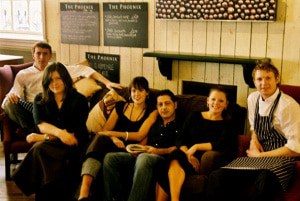Bartenders, also known as bar staff or barpersons, serve drinks and snacks in pubs, clubs, hotels and other licensed premises.
While bar work can be enjoyable and varied, hours tend to be long and often include evenings and weekends.
Rates of pay vary greatly, averaging around £15,000 a year.
Bartenders need strong communication skills, numeracy and physical stamina.
A job as a bartender can provide a flexible part-time or temporary income or be a first rung on the career ladder within the hospitality industry.
Salary
Rates of pay for bar work vary greatly depending on the type and location of the bar and the level of responsibility involved in the job.
Full time salaries for those starting off are around £14,000.
More experienced bar staff earn around £17,000-£18,000 per year.
Many bar jobs are part-time or temporary and staff frequently work a flexible shift system.
Bartenders can supplement salaries by working overtime and may receive tips from customers.
Bar Managers can earn up to £30,000 full time per year if they progress to General Manager level.
Responsibilities
While premises are open for business, bartenders deal directly with customers serving drinks, snacks and sometimes meals.
They also work behind the scenes to keep service and preparation areas clean and well-stocked.
Responsibilities include:
- Serving drinks and snacks
- Collecting payment from customers
- Preparing snacks and simple meals
- Serving hot and cold food
- Clearing and cleaning tables
- Washing glasses
- Emptying ashtrays
- Clearing and cleaning the bar
- Maintaining pumps and changing barrels
- Restocking shelves
- Preventing and dealing with problems between customers
- Organising and running events
Skills

You normally have to be over 18 to work in a bar, but can sometimes start at 16 if you undertake a relevant apprenticeship.
Experience and personal qualities are generally considered more important than formal qualifications.
Useful qualities and skills to have as a bartender include:
- An outgoing personality
- Communication skills
- The ability to work well in a team
- Tact and diplomacy for dealing with difficult situations
- Numeracy
- Physical fitness and stamina
- A good memory
- Reliability
- Responsibility
- Calmness under pressure
- Flexibility
- A smart appearance
Qualifications
Training for bar work is often on-the-job.
Some bars and pubs, especially those that form part of a large chain, may arrange for staff to work towards relevant National Vocational Qualifications (NVQs), Scottish National Qualifications (SVQs) or the qualification for personal licence holders.
Although not essential, the following qualifications are relevant to bar work:
- NVQ/SVQ in Food and Drink Service
- NVQ/SVQ in Hospitality
- Edexcel (BTEC) Certificate in Food and Beverage Service
- NVQ/SVQ Level 3 in Hospitality Supervision
The British Institute of Innkeeping (BII) offer the following courses and awards:
- Customer and Drinks Service
- Award in Beer and Cellar Quality
- Award in Responsible Alcohol Retailing
- Professional Barperson’s Qualification
- Award in Conflict Management
For those aged under 24, apprenticeships in Hospitality, Events and Customer Service are available in England and Wales.
Under the Licensing Act 2003, a personal licence authorises its holder to supply alcohol, or to authorise the supply of alcohol, within licensed premises.
A Personal Licence Holders qualification is therefore useful for those looking to take on supervisory responsibilities.
Higher education qualifications can speed up progression to managerial and executive positions.
Experience
Employers often look for applicants with previous experience of bar work.
General customer service experience, such as work in a shop or cafe, can also be an advantage.
Previous experience of handling cash will demonstrate that you are trustworthy and capable of operating a till.
Applicants with no experience are often offered on-the-job training.
Many people start careers in bartending through work in local or family businesses or at university or college bars.
Working conditions

Pubs are traditionally bustling, noisy places to work.
However, licensed premises in the UK vary greatly; from rock venues to exclusive hotel bars.
As of 1 July 2007, it is against the law to smoke in virtually all enclosed public places and workplaces in England. Scotland’s smoking ban has been in place since March 2006.
One of the main reasons for smoke-free regulations is to protect employees in typically smoky environments from the harmful effects of second-hand smoke.
Find out more about these regulations here.
Clubs and live music venues can be extremely noisy.
Under EU directives, employers have to ensure staff are protected where noise exceeds 85 decibels.
In practice, ear protection is rarely given to bartenders.
The consumption of alcohol is, of course, a common feature of licenced premises.
This means that while bartenders can enjoy working in a sociable atmosphere, there is always the potential for trouble.
Arguments between customers can flare up, as can complaints and abuse towards staff.
In general, bartenders have to stay calm and follow appropriate procedures should anyone get hurt.
Some busy venues will have special security staff on hand to help deal with conflict.
As with any job, those employing bartenders have a duty to protect their staff and keep them informed about health and safety.
Employees also have a responsibility to look after themselves and others, and to discuss any problems with their employer or safety representative.
Bartenders tend to work long hours and often work evenings and weekends.
Work can involve heavy lifting of barrels and crates and bartenders are on their feet most of the time.
Employers
From data collected in 2013, it was found that there are 204,400 premises licences, 15,700 club premises certificates and 544,600 personal licences issued in the UK alone.
For local pubs, clubs and bars, one of the best ways to find work is to go in and ask.
Major employers within the hospitality industry include:
- Brunning and Price
- Fullers
- Greene King (Including links to Old English Inns, Greene King Inns and Hungry Horse)
- Hilton
- J D Wetherspoon
- Mitchells & Butlers (Including All Bar One, Vintage Inns and O’Neill’s)
- Slug and Lettuce
- The Spirit Group
- Youngs
Career progression
Being a bartender can be a foot in the door for those looking to work their way up in pubs, clubs, restaurants or hotels.
According to the British Hospitality Association, the UK had 2.9 million employees within it’s sector in 2014, with numbers steadily increasing year on year.
A rapid turnover of jobs, skills shortages and the prevalence of on-the-job training create a favourable environment for job progression.
Skilled chefs and managers are in particularly high demand in the UK.
Related roles include:
- Waiter/waitress
- Bar manager/assistant manager
- Restaurant manager/assistant manager
- Hotel manager/assistant manager
- Catering manager
- Chef/sous-chef
- Sommelier/wine waiter
- Operations manager
- Promotions/marketing manager
- Events organiser
- Holiday representative
On-the-ground experience is recommended for anyone looking to start their own business in the hospitality industry.
Bar work also offers a flexible way to earn a living while pursuing other things.
Part-time or temporary bar work is ever popular with students and young people on gap-years.
Also known as…
- Bar Staff
- Front of House Staff
- Bar Maid
- Glass Collector
Related Jobs
What’s it really like?
Liz Woollaston has worked at The Bank, an independent bar in Cannock, Staffordshire, since it opened in October 2006.
Why did you want to work in a bar? It fits in well with college, where I’m studying fashion.
How did you get the job? I’d worked in a bar before and saw this job advertised locally when the bar was opening.
What does the job involve? When it’s quiet you serve food as well as drinks, but later on when it’s busy I’m behind the bar making cocktails.
Then there’s cleaning up to do at the end of a shift.
What are the best bits of the job? I don’t have to get up early!
It’s a relaxed atmosphere to work in and it’s sociable so you meet lots of new people.
It’s quite flexible too.
What are the worst bits of the job? Working nights at the weekend, which means I can’t go out.
And sometimes drunken customers get a bit arsey, but we have bouncers there to sort things out.
What are your plans for the future? I’m working towards a career in fashion but I’ll carry on with bar work as well for now because it combines well with studying.








